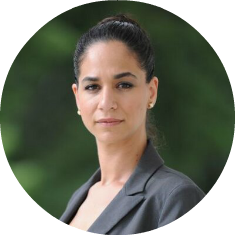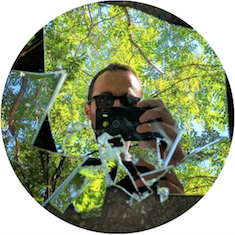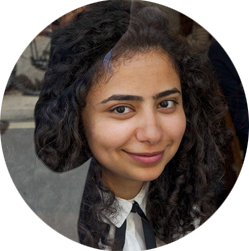MR: For Status I am Malihe Razazan. In her recent op-ed in the New York Times, titled “Gaza Screams for Life,” Gaza based writer Rawan Yaghi describes her visit to the site of the Great March of Return protest at the border two days after the Fridays bloody massacre. She writes “I left the protest thinking of the rest of Gaza. Shell shocked for years, its borders close and its United Nations funded infrastructure in decay. I thought of the kids in my neighborhood who play football in what used to be the ground floor of the tall residential building with bare concrete columns and poking iron rods as there only audience and I thought once again, Gaza the injured has come out to protest and to scream for life.
RY: The daily reality isn’t very different from other places in the world in the sense that the ones that have jobs go to their jobs. Children go to school. Students go to universities. They have dreams. They aspire to achieve them and all of that but you know, it’s the things that are missing that sometimes ruin your day or affect your mood like coming back home and not finding electricity or realizing that the sea is actually polluted and you can enjoy looking at it but really you can’t go into it. You can’t swim unless you want to risk your health. Not having clean water. All of that. Gaza is unlivable at all. People try to overcome this. Some of them don’t like that fact. They don’t like coping with every pressure that is added. Every year things get worse in terms of economy in terms of infrastructure. In terms of borders. Everything gets tighter and people are sick of coping with that. Coping with the fact that things are decaying or getting worse in time and also the fact that politically nothing is moving, everything is kind of on hold if you like.
MR: Can you talk about that a little more what you mean by everything is on hold. What kind of a political shift do you think will relieve some of the pressure on people who live in Gaza?
RY: So the political stalemate is a fact that Hamas and Fatah or Hamas in Gaza and the PA in the West Bank are in constant division. People got really hopeful in September October when there was news about a reconciliation, but that’s when things fell apart again and that’s what I mean by a political state on hold, that nobody is looking for a solution. That everybody including Israel and Egypt are kind of happy about the situation. Just close the borders, suffocate the economy, and starve the people just like give them some breaks so they don’t explode and that’s fine just keep the prison at a minimum cost. Just the fact that everyone is kind of holding on to a political position. We don’t really know who is honest. Who’s telling the truth. And to be honest and people are rightfully doubtful. They don’t trust anyone. They don’t trust Fatah. They don’t trust Hamas. They don’t trust Egypt. And they certainly don’t trust Israel, so the people are living this kind of state where they’re helpless and they’re unsure. They’re unsure about everything and this is part of why these protests and this march was called for.
MR: Who called for the march?
RY: The idea was initiated by a group of intellectuals and it was called for by intellectuals, academics, and the major political parties in Gaza.
MR: And how did they organize so many people? 30,000-40,000 people?
RY: I don’t think they organized it, just called for it, so you would hear speakers going around the streets saying this is a call for the Great March of Return on the eastern borders of Gaza and that it will be a peaceful demonstration that will call for the right to return. And yes, all of the political parties called for it, which is why it’s so huge. It’s all the political parties as well as independent figures, so everyone, like I said in the article, and like I witnessed in the protest. People feel like the march does not represent one entity like a political party but represents the Palestinian entity and the Palestinian Spirit.
MR: You wrote a beautiful opinion piece in the New York Times. You visited a camp Sunday, a couple of days after the bloody day when thousands of Palestinians were shot at by the Israeli snipers and there was tear gas. Give us a sense about what that place looks like. About some of the conversations you had with families with women, men and children who are staying there till May 15. What did they tell you about why they are there?
RY: So the places, it’s actually one of the most beautiful areas of the Gaza Strip. That’s the eastern border. It’s mostly agricultural land so when you live in the center of the city or farther away from the border, it gets denser with buildings rather than trees and fields and that area is just beautiful, it is filled with olive groves and farm lands. And when you look eastwards you can also see farmlands and grain fields into what now is Israel, but the area that is designated for the protest has a few tents, really big tents, that kind of remind you of the 1948 refugee crisis in Gaza, the West Bank, Syria, Lebanon, and Jordan. UN tents if you know what I’m talking about. So a white row of tents with a slogan saying “I will return” or “I have the right to return” or the family of so and so will return. So it was kind of beautiful and sad at the same time that there is this much hope that these people feel about returning and having the world recognize that their right to return. But it was also sad in the sense that it’s such a long tragedy that we’ve been carrying this dream, this burden, or this right, whatever you want to call it. We’ve been carrying it for 70 years. I guess it’s still hopeful. People are still clinging to it. Some of the conversations I had while I was talking to one of the women who seemed really powerful. They had really strong voices and they did not shy from singing or screaming or shouting things like “we shall return” or singing the song that I wrote about in the article a really the famous one for us Palestinians. Some of them were talking about why they’re there. Expressing the fact that they’re there because they claim the right to return and they want that right. One woman said that she had lost relatives, that she had lost her own sons, but that she was there because they are prisoners and on their lands and there’s the horrible situation in Gaza that all of these things are worth marching for, are worth protesting, that we as Palestinian people have always had a voice and have always fought for our rights. It’s kind of made me shy away from my own timidity or political correctness or whatever because she didn’t care who was listening; she just spoke freely and expressed her mind.
MR: And someone told you this march is not a march to return to our land at this very moment, it is a way for us to speak and to raise our voices. I want to go back to the horrible situation the people in Gaza are living under as you said there’s a lack of electricity. Drinking water as a matter of fact, according to World Health Organization, 95% of the water in Gaza is undrinkable. The power plant is not working. 80% of the people in Gaza live on international aid. 60% are under the poverty line. There is almost 50% youth unemployment in Gaza. So how do you get water? Where do you get the electricity from? And what are the impacts of not being able to drink clean water? Not being able to have electricity, which is going to impact so many other things including hospitals? What are the ramifications, the consequences of living under such a stifling conditions?
RY: My family buys water, buys drinking water. We fill in a tank underground almost once every week or week and a half. We buy it from a company that I assume buys it in turn from Israel. I’m not completely sure about this, but I know that the aquifers in Gaza are all polluted so we need to get it from somewhere else. The electricity, we get about four hours a day of electricity. That’s because the power plant, it does work, but it cannot achieve its 100% capacity because of bad maintenance as well as lack of fuel, so we have to wait for either Israel or Egypt to allow us to buy fuel from them. The second questions, what are the ramifications of this? There are many, they are most ones are health consequences. We only use drinking water to drink. So we use polluted water to do everything else. We use it to wash, to wash the dishes, to wash the food sometimes and to water plants.
MR: And this is your tap water right?
RY: Yes this is our tap water, That will definitely impact our health, our digestion systems our skin, everything. We don’t even know if it will have long term effects on our bodies, we do know that our plants will have long term effects on our bodies because we do know they have cancerous agents but they’re all we have. And then as you mentioned, the hospitals, the electricity situation in the hospitals is just terrifying because there are lives that depend on water. There are babies lives that depend on water. You can just imagine a hospital having to face blackouts every maybe more than once a day. And then there are the equally important dangers of this which are the mental health effects. If you live in a place like this you know that you cant go anywhere. You’re locked inside. You’re not only locked inside, but you’re locked inside with a food ration and a electricity ration and a water ration. Its almost like torture, but not directly physical torture so you kind of live in this constant state of – I don’t know what to call it and I don’t know if it has a name, mental health or psychology, but this constant state of being--
MR: I mean people are suffering from post traumatic [stress] syndrome.
RY: Yes exactly, which is what this adds too. Imagine a ten–year-old boy who was born in Gaza and has experience so many traumatic events. Even if they haven’t directly experienced an exposure or something, they will suffer from a post-traumatic stress disorders. Gaza isn’t very big. It is 40km long and 11km wide, so anything that happens anywhere is going to affect everyone. Most people here have some sort of mental health – I mean I can t generalize, there are no studies that prove this, but just logically, if you force a population of 2 million people to go through excessive military attacks then you will have a traumatized population and that population has to live with that trauma as well as the unlivable conditions and the fact that they don’t have basic rights.
MR: And no jobs. I was reading a shocking story by Ajaun France Press that was about overwhelming majority of the men who’ve not able to pay debt. They’re unemployed. They’ve racked up a lot of debt. Their busness has gone bankrupt. And according to some estimates, 42,500 people were arrested in the past year for failing to pay their debt and at least 600 people are currently in jail for similar charges. Gaza is described as an “open air prison” because Israel controls the air, land, and the sea. People can neither get out or get in. You wrote about checkpoints and your own experience crossing Ariz checkpoint. You wanted to go to Jerusalem to go to an American embassy because you had an interview to get your visa. So can you talk about what it means for someone who gets the opportunity or as you say is privileged enough to be able to cross that border, what is that experience like?
RY: That experience is one of the most stressful experiences one can go through. I mean I’ve been through it. A lot of people I know have been through it. It’s just a lot of stress like siting with your heart in your hand because most people who want to get out don’t want to get out because they want to go on holiday, which is a valid reason to travel. If people want to go on holiday they should go on holiday, but it is not the case for people in Gaza. When people want to travel here they’re either on their deathbed or they’re a student who has had a scholarship study abroad or they had a job opportunity abroad and all of these cases are really critical cases in terms of your future. So if your health depends on it or if your future depends on it, then getting that piece of paper that says you’re allowed to get out is a dream basically. It’s a nerve game for everyone that’s involved. It’s a nerve game. For Egypt, and for Israel, and maybe even the PA as well as Hamas maybe. I don’t even know. I haven’t tried to get out recently. Talking in practical terms, you have to apply for a permit if you want to get out of Ariz, which is the checkpoint between Israel and Gaza. You have to apply for a permit from Israel and you have to apply two months in advance and during these two months you will not hear any news about your permit. You will only hear about it the day before you have requested to get out. Or the day of, so you kind of live in this limbo where you don’t know anything for two months. The chance of you getting rejected is 90% so you live on 10% hope. It’s inhumane. It makes us feel dehumanized as well because not having the right to move or determine your own steps in life your own decisions in life is dehumanizing. You’d have to read something that talks about it more in detail because it is not an experience that I can talk to you about in two minutes.
MR: And I really suggest for people to read your piece in Mondowise. It’s called “The Checkpoints.” Something you write in this piece that I hadn’t heard before. You write checkpoints at border crossings in Gaza are also a cruel way to turn needy individuals into collaborators. Can you talk more about this? What happens?
RY: A lot of cancer patients, specifically, have been manipulated and blackmailed into being informants or collaborators for Israel. You ask for a permit to—because you can’t get cancer treatment here in Gaza. You have to go to Israel to get it. So the ministry of health applies for a permit or gives you the necessary papers to apply for a permit and then you might be asked to come to the border for an interview. Or they call it interview. And then in the interview they basically blackmail patients or people who really need to get out. So they say ok we wont let you out unless cooperate with us and cooperate is a nicer, milder version of what they really want. They just exploit people’s needs and especially people whose lives depend on being allowed to--
MR: So they get the permission to leave Gaza and then when they come back they become collaborators?
RY: If they agree to it. If they don’t they wont be allowed out.
MR: Can you give us some examples?
RY: 26-year-old Fadi Al-Kushtan who needed a heart transplant and who basically kept applying for a permit for months with bad luck without any response. He eventually had a call from Israel’s intelligence service who said we know that the device that is keeping you alive is going to stop soon and that he needed to make a simple call for his predicament to be solved, for him to be let out, And he didn’t and because he was trapped in Gaza, he passed away and because his heart failed in 2013. There are so many cases like this.
MR: Rawan Yaghi is a writer based in Gaza and a contributor to the 2014 anthology “Gaza Writes Back.”
MR: You’ve been listening to Status Audio Magazine. Status is produced by the Arab Studies Institute in partnership with Voices of the Middle East and North Africa, cosponsored by George Mason University’s Middle Eastern Studies Program and the American University of Beirut’s Asfari Institute for Civil Society and Citizenship. Interested in pitching an Interview, a program episode, or becoming a partner? Email our associate program producer Paola Messina at paola@statushour.com. To listen to more conversations, on the scene reports, and discussions visit our website statushour.com or subscribe via Itunes and listen to us on the go. You can also friend us on Facebook and follow us on twitter. Thanks for listening and for more conversations please visit statushour.com











